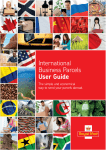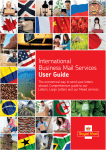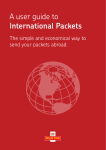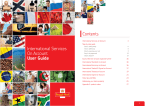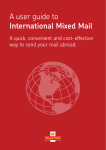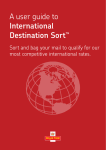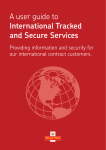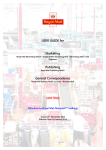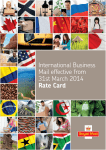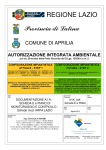Download International Business Parcels User Guide
Transcript
International Business Parcels User Guide The simple and economical way to send your parcels abroad. Contents Contents International Business Parcels 3 Your options 6 Step by step guide 11 Step 1: getting ready 12 Step 2: addressing your parcels 13 Step 3: bagging your parcels or using sleeved yorks 17 Step 4: the paperwork 18 Step 5: despatch 19 Further details on service options 20 Zero Sort and Zone Sort 21 Zero Sort High Volume 23 Max Sort 29 Print Direct (formerly known as M-bags) 32 Bulk Postings for all options in this User Guide 35 Help, tips and FAQs 36 Addressing your parcels correctly 37 Appendix A: Parcels services and their product codes 39 Appendix B: OCR specification for Parcels 40 2 International Business Parcels Firstly, what are ‘Parcels’? A Parcel (formerly known as a ‘Packet’) for the purposes of International Business Parcels is considered as anything that: Has a side which is over the size of 381 x 305mm Or is over 20mm thick Or is over 500g in weight. If your mail is smaller or lighter than this, it will either be a Large Letter or a Letter and will need to be sent under International Business Mail. You can find out more about our International Business Mail service by visiting our business home page at www.royalmail.com/internationalbusinessmail Note that where the term ‘Parcel’ is used in this User Guide, the meaning above applies and not the meaning of ‘Parcel’ as set out in the Royal Mail General Terms and Conditions. 3 International Business Parcels Size and weight limits Size limits Items packed flat: Minimum: One surface at least 90mm x 140mm. Maximum: Length plus depth plus width no greater than 900mm. No single side must be longer than 600mm. Items packed rolled up: Minimum: length plus twice the diameter must be at least 170mm. Neither the length nor the diameter can be less than 100mm. Maximum: Length plus twice the diameter must not be more than 1040mm. The length must not exceed 900mm. Weight The maximum weight for an individual item is 2kg. However, you can send books and pamphlets, i.e. any papers ‘bound’ together, up to 5kg. Items between 2kg and 5kg in weight which contain books or pamphlets, must be marked ‘Printed Papers’ in the top left hand corner on the front of the parcel. You must not include personal correspondence with these items. Please note - exceptions to the information above: Ireland – only books can be above 2kg up to the limit of 5kg Cambodia – no items above 2kg Canada – no items above 2kg. Items that exceed these weight limits may be sent through Parcelforce Worldwide who have separate services not covered by this User Guide. They can be contacted via their enquiry centre on 0800 22 44 66 or more information can be found at www.parcelforce.com 4 International Business Parcels Qualification criteria To qualify for these services you will need to spend more than £5,000 (or £10,000 for Max Sort) per annum across the International Business Services portfolio. Further details are set out in the Specific Terms for International Business Services. This User Guide shows how International Business Parcels works, but if you have any questions, we’ll be glad to help – just call 08457 950 950 (local rate). Or you can find out more at our website at www.royalmail.com/internationalbusinessparcels This User Guide forms part of the operational terms referred to in the Royal Mail General Terms and Conditions. 5 Your options International Business Parcels gives you various options for presenting your parcels. These range from handing over a bag or York of items and letting us do everything else, to sorting your parcels into different destinations. Here are your choices: Zero Sort All you need to do is separate your parcels by service speed – we’ll do the rest. You need to provide us with details about your daily mail by counting and weighing that day’s mail and completing the necessary documentation. Zero Sort High Volume This option offers country specific pricing. This is an option for customers sending bulk postings of 1,000 items or more per mailing overseas. If you are using our UK sorted mail services, you can combine your UK and International mail volumes, to reach the requirement for 1,000 or more items in total. This applies to UK Advertising Mail™, Publishing Mail or Business Mail. In this scenario, the minimum quantity of parcels you must send internationally to use the International Business Parcels service for Zero Sort High Volume, per service speed (Priority or Economy), is five parcels. Scenario 1 Total posting of 1,200 international parcels – qualifies for Zero Sort High Volume. If different service speeds (either Priority or Economy) are selected, the minimum number of parcels that can be sent per speed is five. Scenario 2 Total posting of 950 international parcels and no UK sorted mail volume does not qualify for Zero Sort High Volume. You should select either Zero Sort or Zone Sort instead. Scenario 3 Total posting of 750 international parcels and 500 UK sorted items qualifies for Zero Sort High Volume. 6 Your options Zone Sort To benefit from Zone Sort, you need to separate your mail into two selections: European Union and Rest of World. The purpose of this is that VAT will only be levied on EU traffic. You also need to separate your parcels within those two categories into service speeds (either Priority or Economy). For details of which countries fall within the European Union, please refer to the Option Specific features and requirements section on page 21. Max Sort This sorting option offers a cost saving for customers who sort their parcels by destination. A destination is the location where we hand your mail over to the domestic postal authority. For many countries this is a single point but for some countries there are multiple destinations. You need to present a minimum bag weight of 1.5kg of parcels per destination to use the option. Print Direct Print Direct can be used if you’re sending printed matter items (e.g.newspapers, periodicals, books, etc) to the same address worldwide. With the exception of Canada, Print Direct can also be used to send nonpersonalised magnetic media items (e.g. CDs and videotapes) and other items that do not incur duty (e.g. commercial samples, disks etc.), that relate to the printed matter and have been attached to it by the manufacturer or distributor. With the exception of New Zealand, Print Direct cannot be used for any form of personalised correspondence (e.g. letters, statements, invoices etc.) or for mail containing any enclosures of commercial value (other than permitted printed matter). 7 Your options Delivery speed options There are generally two options available for International Business Parcels: Priority and Economy (except when either the Max Sort sorting option or the Print Direct option is used – see the ‘Max Sort’ and ‘Print Direct’ service specific sections of this User Guide for further details). Our delivery aims are: Priority Standard (Max Sort and Print Direct only) Economy Europe Rest of World 3 - 5 days 5 - 7 days N/A 14 – 21 days 10 - 15 days 6 - 12 weeks Days refer to working days and exclude the day of posting, Saturdays, Sundays and Bank Holidays in the UK and overseas. 8 Your options To identify which countries we classify as Europe for delivery speed purposes, please see the table below. Any countries not mentioned are classed as Rest of World. Europe Albania Estonia Kyrgyzstan Russian Federation Andorra Finland Latvia Serbia Armenia France (inc Monaco) Liechtenstein Slovak Republic Austria Georgia Lithuania Slovenia Azerbaijan Germany Luxembourg Spain (inc Canary Islands) Belarus Gibraltar Macedonia Sweden Belgium Greece Malta Switzerland Bosnia & Herzegovina Hungary Moldova Tajikistan Bulgaria Iceland Montenegro The Netherlands Croatia Ireland (Rep of) Norway (inc Spitzbergen) Turkey Cyprus Italy (inc San Marino and Vatican City) Poland Turkmenistan Czech Republic Kazakhstan Portugal (inc Azores and Madeira) Ukraine Denmark (inc Faroe Islands and Greenland) Kosovo Romania Uzbekistan 9 Your options International Business Parcels at a glance Here is a summary of the options for sending parcels (Print Direct not included): Sorting options Delivery speed Indicia required Sorting required VAT applied Documentation required Machinable Min volume per posting Priority ✔ None Worldwide Sales Order Optional None Economy ✔ None Worldwide Sales Order Optional None Priority ✔ None EU Sales Order Compulsory 1,000* Economy ✔ None EU Sales Order Compulsory 1,000* Priority ✔ EU/Rest of World EU Sales Order Optional None Economy ✔ EU/Rest of World EU Sales Order Optional None Priority ✔ EU Sales Order Optional Zero Sort Zero Sort High Volume Zone Sort Max Sort Standard ✔ Economy ✔ Bagged and Sorted to mail handover point EU Sales Order Optional EU Sales Order Optional Min bag weight 1.5kg, per handover point * Unless combined with a UK sorted bulk mail posting as described in this User Guide. 10 Step by step guide Everything you need to know, from addressing your parcels to despatching them. Regardless of which option you choose, the following pages detail the steps you need to take in order for us to get your parcels where you want them, when you want them there. 11 Step by step guide – 1 Getting ready Check what you’re sending International Business Parcels can be used to send any personalised parcels or items of commercial value as well as non-personalised direct marketing communications like catalogues and directories. Prohibited and restricted items There are certain prohibited items which you must not send and restricted items which may have conditions attached to their sending. What is prohibited or restricted varies from country to country, and can sometimes include apparently ordinary things. If you are unsure about anything, please contact the Royal Mail Sales Centre on 08457 950 950. Or visit www.royalmail.com/countriesAtoZ. Refer to the Royal Mail General Terms and Conditions provisions covering prohibited materials and restricted materials. Dangerous items and substances You must not send dangerous items and substances by any of Royal Mail’s international services. Dangerous substances include explosive fireworks, gases, flammable liquids, toxic substances, corrosive chemicals, etc. Please note – aerosols cannot be carried in the postal network. Classifications of dangerous items and substances may change so please check with the Royal Mail Sales Centre on 08457 950 950. Or visit www.royalmail.com/prohibitions Check the size and weight of your parcels Make sure your parcels fall within the size and weight limits set out on page 4. 12 Step by step guide – 2 Addressing your parcels Address your mail Please address your parcels as clearly as possible. Pages 37 and 38 show sample addresses for most European countries and many others too. There are also a few basic rules to follow to help us get your parcels to their destination safely: Addresses must be applied on one of the largest sides of the parcel Addresses should be printed using one of our machine readable fonts as detailed in Appendix B on page 40 All parcels must have a valid country on the last line of the address. This must be in English and not abbreviated (although USA is acceptable). There must be nothing else on the last line of the address apart from the country name The town and country should be in capital letters Many countries operate a postcode system. A valid postcode should be included in the address for these countries There should be a ‘clear zone’ of 5mm around the address, with no other information contained within the clear zone. If a window envelope is used, the address should be 5mm clear all round from the edge of the window. For up to date information on acceptable address formats, visit www.upu.int 13 Step by step guide – 2 Return address If you would like your undeliverable parcels returned, please put your UK return address on each item (ideally at the edge of the parcel at a right angle to the delivery address) and ensure there is a company identifier (i.e. a logo or company name). We do recommend that you apply a UK return address to the outside of every item as your mail may experience delays if you fail to apply a UK return address. You must include a UK return address if you send over 1,500 items in a single posting to one country or over 5,000 items over a two week period to a single country. Do I need a customs form? If you are sending an item to a destination outside the European Union, it will need a customs label if it is either: An item of value Mail with a fulfilment or enclosure (item of commercial value). For parcels up to and including a value of £270, attach a signed, completed CN 22 form (shown below) to the front of the item. For parcels with a value over £270 use a CN 23 form in a plastic wallet (stock item code: SP 301). On both you will need to sign to certify that the item does not contain any dangerous articles, prohibited by postal regulations (you are responsible for checking this). For further details and to download a CN 22 template, visit www.royalmail.com/customs Example CN 22 – For use with items up to a value of £270 Example CN 23 – For use with items over a value of £270 Customs declarations can be ordered by contacting Royal Mail on 08457 950 950 or you can download templates from www.royalmail.com/customs 14 Step by step guide – 2 Who pays customs duty? Customs charges are the responsibility of the recipient. For current rates and categories, please contact the Department For Business, Innovation and Skills on 0207 215 5000. Printed Postage Impression (PPI) and Airmail indicators All items sent under the Business Parcels Services must bear a PPI. Printed Postage Impression (PPI) Each PPI design, examples below, has its own specification that has to be followed when you produce your artwork. Each PPI is made up of two components: the delivery speed indicator and the ‘Delivered by Royal Mail’ mark. The dimensions of the delivery speed indicator graphic must not be altered and must be one of the four sizes permitted. The text with the delivery speed indicator, e.g. ‘Postage Paid’ and the initials ‘GB’ and PPI licence details text in the PPI design must not be altered other than to insert the PPI licence number and, where appropriate, a town name. All other text must remain fixed. You can choose not to include the ‘Delivered by Royal Mail’ mark within the PPI, but you must have the delivery speed indicator. You can select from four sizes of PPIs. Full details on PPIs are available at www.royalmail.com/ppi Example of a PPI with both the delivery speed indicator and the ‘Delivered by Royal Mail’ mark: Example of a PPI with only delivery speed indicator: PPI licence details: Please note that ‘HQ31’ provides an example of where your PPI licence number should appear. Please replace this text with your PPI licence number. The PPI licence details must always appear below the words ‘Postage Paid’ and the initials ‘GB’. The PPI licence number must always appear after HQ if you are using a national PPI licence, e.g. HQ 2500, or after the town name if you have a local PPI licence, e.g. ‘SOUTHAMPTON 2500’. Postage Paid GB: The words ‘Postage Paid’ and the initials ‘GB’ must appear in all PPI designs irrespective of which PPI you are using and the destination of your mail. 15 Step by step guide – 2 Airmail indicator If you are sending an item through the Priority delivery speed it must have either: An Airmail indicator An Airmail label. To download Airmail artwork go to www.royalmail.com/internationalbusinessparcels or labels can be ordered on 08457 950 950 (order code P25A). You may also create your own indicator, provided the words Airmail, Par Avion or Prioritaire are used. This should be positioned as close as possible to the top left hand corner on the front of the item. Failure to apply an Airmail indicator or label will result in your items being delayed. 16 Step by step guide – 3 Bagging your Parcels or using sleeved Yorks The standard method of despatching parcels is to use mail bags. However, depending on volumes and operational capability, it may be possible to use sleeved Yorks. Please discuss your requirements with us by calling the Royal Mail Sales Centre on 08457 950 950. Bags Make sure all bags are sealed around the neck with a bag tie and that they are securely tied with a fully complete label (or labels) attached. For more detail please refer to the section with further details on service options. Your parcels need to be sorted by service speed and placed in separate bags. Finally, a mail bag including all its contents must not weigh more than 11kg. Bags which are heavier than this will increase the risk of our staff suffering injury. Sleeved Yorks Sleeved Yorks can be used for high volume parcel traffic without the need for bags (apart from the Max Sort and Print Direct sorting options). This saves you time in preparation and despatch. When using a sleeved York, you must affix a fully completed label by tying a normal bag tie through or around the fastening device on the York (this may be a zip or a clip). Your parcels need to be sorted by service speed and placed in separate Yorks. For more details please refer to the appropriate section within this guide. 17 Step by step guide – 4 The paperwork Once you have prepared and labelled your parcels, you must create and print a sales order from the Online Business Account (OBA) system. Online Business Account Online Business Account (OBA) is a customer ordering facility available to all our account customers. OBA allows you to create sales orders electronically, and holds your mailing history so you can retrieve reports and export information to perform further analysis. Benefits of OBA include: Streamlined ordering and online payment Easy yet secure access to your records Fast and easy account management, all in one place. For further information visit: www.royalmail.com/oba When using Zero Sort and Zone Sort sorting options you will need to select the sorting option and zone (if applicable), and input the number of items and the average weight. When using the Zero Sort High Volume sorting option you must input into OBA the number of items and their average weight, for each country you are sending to, as this sorting option offers country specific pricing. We have created an OBA Data Generator which you can use to facilitate a quick and easy ‘mail file upload’ process. This is available for download from www.internationalmailtechnical.com Alternatively, you can develop software to provide an electronic transfer mechanism to the OBA Interface. Testing and accreditation for the electronic link will be undertaken separately by our OBA technical support team. Work out the costs using the Rate Card To calculate the cost of your mailing, please refer to the International Business Parcels Rate Card. This can be downloaded from the document library at www.royalmail.com/internationalbusinessparcels There is also a pricing calculator available to download at www.royalmail.com/internationalbusinessparcels For details of the International Business Parcels service codes refer to Appendix A on page 39. 18 Step by step guide – 5 Despatch Collection If you have a local daily collection of mail then your Zero Sort (not Zero Sort High Volume), Zone Sort, Max Sort and Print Direct parcels can be collected at the same time. Please note, Zero Sort High Volume is collected by the Regional Distribution Centre network. If you require a collection, please contact the Royal Mail Sales Centre on 08457 950 950 to arrange this. Order more supplies Once you’ve completed your mailing, you may need additional stocks of bags/Yorks, ties, labels and customs forms ready for your next mailing. Please contact us on 08457 950 950 for more supplies and allow 72 hours for the delivery of stock. Alternatively you can order your mail supplies when you log into the Online Business Account System or visit www.royalmail.com/mailsupplies 19 Further details on service options This section of the User Guide outlines some further details about the various International Business Parcels options available to you. 20 Zero Sort and Zone Sort A few things to remember about Zero Sort and Zone Sort: All items must have a Printed Postage Impression All items sent Priority must have an Airmail indicator or label applied Economy parcels must not have an Airmail indicator or label Zone Sort Mail must be sorted separately into EU and Rest of World (see below). Other destinations that sit within Europe but are VAT exempt and can be sent as a Rest of World selection include: EU countries are: Austria Belgium Bulgaria Croatia Cyprus Czech Republic Denmark (except Faroe Islands and Greenland) Estonia Finland (except Aland Islands) France Germany Greece Hungary Ireland Italy (except Vatican City) Latvia Lithuania Luxembourg Malta Netherlands Poland Portugal Romania Slovak Republic Slovenia Spain (except Canary Islands) Sweden 21 Zero Sort and Zone Sort Other destinations that sit within Europe but are VAT exempt and therefore can be sent as a Rest of World selection include: Andorra Gibraltar San Marino For a comprehensive list please visit: www.hmrc.gov.uk/vat/managing/international Labels All bags must be sealed with a bag tie of stock option type LN2. Shown below are the labels which are required to be fully completed and attached to a mail bag or york for all postings: Priority (P5627C) Economy (P5629C) 22 Zero Sort High Volume As a reminder, this option has a minimum entry criteria of: 1,000 parcels if the posting is purely international across the two service speeds, or when combined with a UK sorted bulk mailing then the international element must consist of at least five parcels per service speed. If your mailing consists of both international and domestic elements, the total must reach the minimum of 1,000 parcels. For example, a mailing of 750 domestic parcels and 250 international parcels would qualify for the Zero Sort High Volume option. There are also additional mail piece requirements: In addition to the addressing requirements already mentioned in the section titled ‘Addressing your parcels’ on page 13, the parcels must have a machine readable font. This is detailed in Appendix B on page 40 and the address needs to be on one of the largest sides of the parcel. Mailing data required at time of posting As already mentioned, a sales order from OBA is required at the time of posting however there are a few more pieces of paperwork required: A Computer Planning Report A Line Listing. Production of these can be easily facilitated by the OBA Data Generator. Note: You can provide the Computer Planning Report and Line Listing in hard copy or electronic formats. 23 Zero Sort High Volume Computer Planning Report The Computer Planning Report summarises your mailing, including information such as customer details, overall volume, item weight, item format, job reference number, and the split between selections for Zero Sort High Volume Priority and Economy. If using this service in conjunction with UK sorted bulk mail services, more details on Computer Planning Reports are available from the respective User Guide. To download a copy visit www.royalmailtechnical.com The report can be tailored to suit your needs. However, for mailings which contain both international and domestic elements, the Computer Planning Report must contain the following information – mandatory information for Zero Sort High Volume mailings is highlighted in bold: Name and address of the poster (agreement holder) Posting date Account number Service required – including the international service speeds Minimum selection size The format of the item – Parcels Number of selections, the maximum is two selections for overseas (for domestic sorted bulk mail services, the number of direct and residue selections are required) Number of International Bags (for domestic sorted bulk mail products, the number of direct and residue bags) Total items Total weight Job reference number Percentage of mail fully and accurately postcoded for the UK. An example of a well-designed computer planning report for a UK sorted posting, containing Country Sort High Volume mail with all the mandatory information is shown on the next page. 24 Zero Sort High Volume Company Name Account Number Address Line 1 Address Line 2 Town Postcode [Insert sorted service name] and International High Volume Parcels Date: (Insert service name*) Minimum Selection Size Weight of item* Format* Job Reference Number* Royal Mail International Business Parcels Zero Sort Pre–sortation Statistics Address records processed Postcodes matched Post towns matched Number suitable for Mailsort Postcode Statistics (% of address records processed) Full Postcode Outward Postcodes only Postcode level No Postcode Sortation Statistics Number Items* % Match Bags* Direct selections Residue selections Royal Mail International Country Sort Letters Totals Cost & Discounts Number of Mailsort items Item weight (g) Postal rate (p) p Straight line item cost p Straight line item cost £ Direct selection discount (10551 items at XX%) (£) Residue selection discount (10117 items at XX%) (£) Mailsort Discounted cost £ TOTAL DISCOUNTED COST £ * Indicates all mandatory information. 25 Zero Sort High Volume If sending a purely international mailing, the Computer Planning Report should contain the following information. Mandatory information is shown in bold: Name and address of the poster (business holder) Date posted Account number Service required – Priority or Economy The format of the item – Parcels Total number of items Total weight of mail Total number of bags Job reference number. An example of a well-designed Country Sort High Volume computer planning report is shown below: Company Name Account Number Address Line 1 Address Line 2 Town Postcode International Business Parcels Zero Sort Date: International Business Parcels Zero Sort Minimum Selection Size 5 Format* Parcel Service Speed: Items Weight (kg) Bags Items Weight (kg) Bags Priority Economy * Indicates all mandatory information. 26 Zero Sort High Volume Line listing In addition to the Computer Planning Report, you must provide a Line Listing and this must either precede the mailing or accompany it on its first collection. You may find it useful to have more than one copy – you can keep one for your own records and use another to help you spot section breaks during production of the mailing. The Line Listing should contain the following information – information shown in bold must be included: Poster’s company name The date of the mailing Account number Service Speed Selection code: Priority is 99891 and Economy 99895 Selection name: International Priority / International Economy Total items, weight and bags split by service speed – Priority and Economy for international mail A cumulative total on each line for items and bags A subtotal for each five digit selection code. How many copies do you need? We recommend you produce three copies: One for your own records One for use on the production line, which may be written on and thrown away once the job, is complete One to hand to us at the time of the first collection of the mailing, or beforehand where possible. 27 Zero Sort High Volume Standard Line Listing Date: Company Name Account Number International Zero Sort High Volume Parcels SSC* Selection Name 99891 Priority 99895 Economy Total Items* Total Bags* Total Weight* Cumulative Items* Cumulative Bags Total * Indicates all mandatory information. Despatch of mail Once the mailing is ready to be despatched, your parcels can be handed over to us either in bags or sleeved Yorks, subject to operational agreement. All bags are to be sealed and a bag label as shown below attached to the neck of the bag – not the loops. The next step is to load the bags into RSCs (Rigid Stackable Containers) (some areas of our network may offer Yorks – which are containers on wheels – as an alternative to RSCs). 28 Max Sort Max Sort (formerly known as Destination Sort) By sorting and bagging your mail before handing it over to us you can qualify for our most competitive international rates. Unlike the other International Business Parcels sorting options, this option offers three speeds of delivery – Priority, Standard and Economy – (see page 8). To qualify for Max Sort you will need to spend a minimum of £10,000 per annum across the Royal Mail International Business Services portfolio. See the Royal Mail Specific Terms for International Business Services for further details. What you need to do First, you need to separate your parcels from your other mail items. Then you need to sort your parcels by destination and by service speed. Using the Sorting List Once you have decided which delivery speed you want to send your mail by, you need to sort all items by their ‘destination’. The ‘destination’ is the location where we hand your mail over to the domestic postal authority. To do this, please refer to the International Max Sort Sorting Lists available at www.royalmail.com/internationalbusinessparcels The sorting lists are divided into Priority, Standard and Economy sections, and then into regional zones (e.g. Western Europe, Africa & Asia). Countries are listed alphabetically within each zone. The Sorting List tells you which areas or postcodes need to be sorted to a particular destination and which bag labels you need for that destination. Most countries have one handover point however, larger countries, such as USA have several ‘destinations’ based on the postcode/location on the item. 29 Max Sort International Max Sort database If you plan to sort your parcels electronically you can ensure the accuracy of your parcel sorting and increase the efficiency of your preparation by using the International Max Sort database. Visit www.internationalmailtechnical.com for more information Bagging your mail Once sorted, all parcels to each destination need to go into a separate bag. It is important you use the correct bag for the delivery speed you are using: Priority Use a blue airmail bag, marked MB 4GB. Standard Use a grey surface bag, marked MB8 or opaque MB10. Economy Use a grey surface bag, marked MB8 or opaque MB10. How much (and how little) can go in a Max Sort bag You can put as many items in a bag as will fit. The bag, labels, ties and its contents: Must weigh at least 1.5kg Must not weigh more than 11kg inclusive of bag, ties and labels And must still be securely sealed. Then use black tamper proof Post Grip Bag ties (IDC01) to seal the bag. Please be careful not to use our standard black bag ties. You must then ensure the bag is sealed around its neck and not the loops. 30 Max Sort Labelling your mail Destination labels Please look in the Max Sort Sorting List for details of which destination label to attach to each mail bag. It is essential that you use the correct destination label – they vary by service: Marked PRIORITY – white in colour Marked STANDARD – white in colour Marked ECONOMY – white in colour Max Sort label supplies To order your mail supplies for Max Sort, please visit www.royalmail.com/internationalbusinessparcels Examble of a Max Sort bag label 31 Print Direct (formerly known as M-bags) If you are using Print Direct then you must put the items together in the bag and attach a Print Direct address label. The bags are not opened until they reach their final destination. This reduces sorting and handling costs and results in lower prices. What you need to do 1.Address your bags correctly and clearly. 2.Place all items which are going to the same address inside a mail bag. 3.Bundle loose items together. 4.Select the delivery speed. 5.Affix the appropriate address label and routing label to the mail bag. 32 Print Direct Address your items correctly We recommend that all items inside each mail bag are labelled to the destination address and carry a PPI and a UK return address. This is to ensure that, in the unlikely event of bags being opened, all items will be delivered with minimal delay. Please note, you will only be charged for the Print Direct bag, you will not be charged per item. Bagging your Print Direct parcels Once sorted, it is important you use the correct bag for the delivery speed you are using: 1.Priority Print Direct - use a blue airmail bag, marked MB 4GB. 2.Standard Print Direct - use a white ‘one-trip’ bag, marked MBX. 3.Economy Print Direct - use a white ‘one-trip’ bag, marked MBX. Bundle loose items together To ensure that loose items arrive in the best possible condition, please ensure they are bundled together. Select the delivery speed There are three delivery speeds you can use: Priority, Standard and Economy (see page 8). Affix an address label and routing label to the mail bag Once you have placed your items into the Print Direct bag, you need to seal the bag, following the instructions for Max Sort (see above) You then need to apply a Print Direct Bag Label – stock item 0E1050C – and upon this label, you need to write the destination address Bags with a destination outside the EU must have a CN 22 customs form (found on the back of the Print Direct label). If the value of the mail bag is over £270, then you must affix a CN 23 customs form over the CN 22 label Affix a Print Direct routing label, which can be obtained by using the Max Sort sorting list. 33 Print Direct How much (and how little) can go in a Print Direct bag You can put as many items in a bag as will fit. The bag, labels, ties and its contents: Must weigh at least 1.5kg Must not weigh more than 11kg inclusive of bag, ties and labels And must still be securely sealed. Then use black tamper proof Post Grip Bag ties (IDC01) to seal the bag. Please be careful not to use our standard black bag ties. You must then ensure the bag is sealed around its neck and not the loops. For details on how to tie the bags, please see page 17. Print Direct bag and label supplies To order your mail supplies for Print Direct, please visit www.royalmail.com/internationalbusinessparcels 34 Bulk postings for all options in this User Guide You must notify [email protected] 48 hours in advance by email, if in a single posting you are: Sending more than 5,000 parcels worldwide Sending more than 1,000 parcels to a single country Sending more than 500 Print Direct or Max Sort bags to multiple countries Sending more than 50 Print Direct or Max Sort bags to a single country. If you fail to pre-warn us of these quantities, there may be a delay in the delivery of the mail. 35 Help, tips and FAQs Here is where you can find further information about International Business Parcels. If your question isn’t answered here, call us on 08457 950 950 (local rate) and we’ll do our best to help. How should I present my parcels? The standard way of presenting your International Business Parcels is by placing your items into a mail bag. By arrangement with your local mail centre / regional distribution centre it may be possible to present your parcels in sleeved Yorks rather than using bags. How do I work out the costs in advance of a posting? We’ve created a pricing calculator for you to download free at www.royalmail.com/internationalbusinessparcels 36 Addressing your parcels correctly Here are examples of how you should address your mail, depending on where you’re sending it to: Western Europe Herr Franz Huber Beethovenstrasse 12 1010 WIEN AUSTRIA Mr George Latsis Alkamenou 37 117 80 ATHENS GREECE M. Emile Dubois Rue du Diamant 215 4800 VERVIERS BELGIUM Mr Jon Jonsson Einimel 80 107 REYKJAVIK ICELAND Mr Thor Nielsen Tietgensgade 137 8800 VIBORG DENMARK Mr Gerard Carey 45 O’Connell Street DUBLIN 1 REPUBLIC OF IRELAND Mr Torben Raldorf PO Box 100 COPENHAGEN 1004 VIBORG DENMARK Sig. Giovanni Masci via Garibaldi 27 47037 RIMINI RN ITALY Mr Asko Teirila PO Box 511 39140 AKDENMAA FINLAND M. Robert MARIN Rue de l’Eglise Dunes 82340 AUVILLAR FRANCE Mme Marie PAGE 23 Rue de Grenell 75700 PARIS CEDEX FRANCE Mrs F Meier Weberstr. 2 53113 BONN 1 GERMANY Mr P Kunde Langestr. 12 04103 LEIPZIG GERMANY M. Jaques MULLER 71 Route de Longway 4750 PETANGE LUXEMBOURG Mr J van Dieten Morsstr 111 2312 BK LEIDEN THE NETHERLANDS Herr Hans Hansen Svingen 22 9230 BEKKEHAUG NORWAY Senhor Carlos Manuel Pereira Av das A’Augsa Livres Monte Trigo 7220 PORTEL PORTUGAL Rosalina Silva R Conde Redondo 80 1192 LISBOA CODEX PORTUGAL Mimbreras 4 03201 ELCHE (Alicante) SPAIN Fru Inger Lilja Vasavagen 3 4tr 582 20 LINKOPING SWEDEN M. Andre Perret Schanzenstrasse 7 3030 BERNE SWITZERLAND Mail to France When addressing mail to France, write the surname in CAPITAL letters. Mail to Germany Due to Germany’s strict conditions for accepting mail, when addressing your items you must: Use the five-digit postcode. Put the postcode before the town name. Put the house number after the street name. If the above is not carried out, your mail may be returned with no attempt at delivery. Mail to the Republic of Ireland Only Dublin has postcodes. Sra Ana Jimenez 37 Addressing your parcels correctly Rest of World Mr J Brownhall 264 High Street ALLAMBIE NSW 2100 AUSTRALIA Sr. Ronaldo Ganclaves Av Paulista 952, Apto 16 B VISTA 01311-300 Sâo Paulo – SP BRAZIL Mr Yushi Morimoto 504 Kasumigaseki 1 chome, Chiyoda-ku TOKYO 100 JAPAN Mr Hong Kil-Dong 100 Sejongno, Jongno-gu SEOUL 110-050 REPUBLIC OF KOREA (Items for the former Yugoslavia should be addressed to the Republic concerned). Mr Tan Kay Hui 532 Chai Chee Road SINGAPORE 1646 SINGAPORE M Jan Kemr Olsanka 18 820 01 BRATISLAVA 1 SLOVAK REPUBLIC Dr Tzantcho Gantchev Dimo Hadjikimov 6 1606 SOFIA BULGARIA Mr Joaquim Cepeda San Antonio Abad 120 – Piso 4 06820 CIUDAD DE MEXICO MEXICO M. Jen Durand 150 Rue Nepeau App 5 OTTAWA ON K1P 2P6 CANADA Mr B Parker 64 Waterloo Quay WELLINGTON 1 NEW ZEALAND Mr Sudhorn Yoothong 13 / 54-26 Chaeng Waltana Road Bang Kehn BANGKOK 10002 THAILAND Ana Car Ilica 25 41 000 ZAGREB CROATIA Mr Jan Kalinkowski ul Cicha 5 62-806 KALISZ POLAND Mr Mazhar Alkan Iskele Caddesi 35 06101 ANKARA TURKEY M. Miroslav Ondevejka| Fibichova 92 125 02 PRAGUE 3 CZECH REPUBLIC Mr Gheorghe Petraru Bd Golescu 38 77113 BUCHAREST ROMANIA Mrs L Projivalsky 252001 KIEV Prospect F Skaryna UKRAINE M. Horvath LASZLO Budapest Kossuth u.7 1055 HUNGARY Ivanova I.S. Oulitsa Gagagin 7 103375 MOSCOW RUSSIAN FEDERATION Mr Joe Engle 1612 Dexter Street FORT WAYNE, IN, 46805 UNITED STATES OF AMERICA Mr Stevan Raukovic Palmoticeva 2 11001 BELGRADE SERBIA Mr Bill Harrison 347 L’Enfant Plaza SW WASHINGTON, DC, 20260-6500 UNITED STATES OF AMERICA Mr G Kaul 27 Rue Yafo 91999 JERUSALEM ISRAEL 38 Appendix A: Parcel services and their product codes Service Product Code Zero Sort Priority WE1 Zero Sort Economy WE3 Zone Sort Priority IE1 Zone Sort Economy IE3 Zero Sort High Volume Priority DE1 Zero Sort High Volume Economy DE3 Max Sort Priority PS9 Max Sort Standard PSC Max Sort Economy PS0 Print Direct Priority MB1 Print Direct Standard MB2 Print Direct Economy MB3 39 Appendix B: OCR specification for Parcels The majority of International Business Parcels will be sorted by machine at our Heathrow Worldwide Distribution Centre. All postings must therefore be machine-readable by our Optical Character Recognition (OCR) software. How it works Using Optical Character Recognition (OCR) software requires you to print your addresses in a typeface that our sorting machines are able to read, by breaking each line down into separate characters or words and looking for vertical white paths between them. However, in order for OCR to function properly, only certain fonts can be used and print quality must be of a certain standard. For example, using typefaces that are more unevenly spaced than others or printing labels on a printer where the ink is running low may cause the item to be rejected and us having to resort to manual sorting mode, which can cause delay and affect your discount level. There are a variety of fonts you can use, though we recommend you use one from the list below wherever possible. We also recommend you regularly check the quality of your print output for clarity. If you have any doubts on either of these requirements, please contact your account manager. Here are examples of recommended typefaces: Arial 10 – 12pt regular Avant Garde 11 – 15pt regular Century Schoolbook 10 – 11pt roman and bold Courier 10 – 15pt regular and bold Franklin Gothic 11 – 14pt book Geneva 10 – 12pt regular Helvetica 12 – 15pt regular and bold 40 Appendix B: OCR specification for Parcels Typefaces with the following characteristics are also suitable: Size – Height: 2mm min; 7mm max. Width: 7mm max Dimension – minimum ratio of lower case height (b) to upper case height (a) of between 2:3 and 3:4. A ratio of width (c) to height (a) of approximately 2:3. Consistency – each line of the address should be in the same typeface and size Quality – characters must be complete, clear, uniform and of high resolution, with individual stroke thickness of between 8% and 16% of the height of the character Contrast – there should be a contrast between the characters and the background on which they are printed of at least 50% (55% if it is to be read through a window) Positive Contrast or Inverse Printing (address block lighter than the background) is not permitted Character spacing – there should be a fixed pitch of between 10 and 12 characters per inch (or between 15 and 10 point size), with clear vertical gaps of at least 0.25mm between the extremities of adjacent characters If you are using proportionally spaced text, please ensure you keep spacing of at least +0.75, as this significantly improves the rate at which addresses can be read Line spacing – allow uniform spacing between all lines of the address, of at least 1mm – 4mm. There must be no blank lines. Although correct at the date this booklet went to print, from time to time services may be added to, or withdrawn. Up-to-date information is available at www.royalmail.com/internationalbusinessparcels Royal Mail, the Cruciform and the colour red are registered trade marks of Royal Mail Group Ltd. International Business Parcels. © Royal Mail Group Ltd 2014. All rights reserved. 41









































